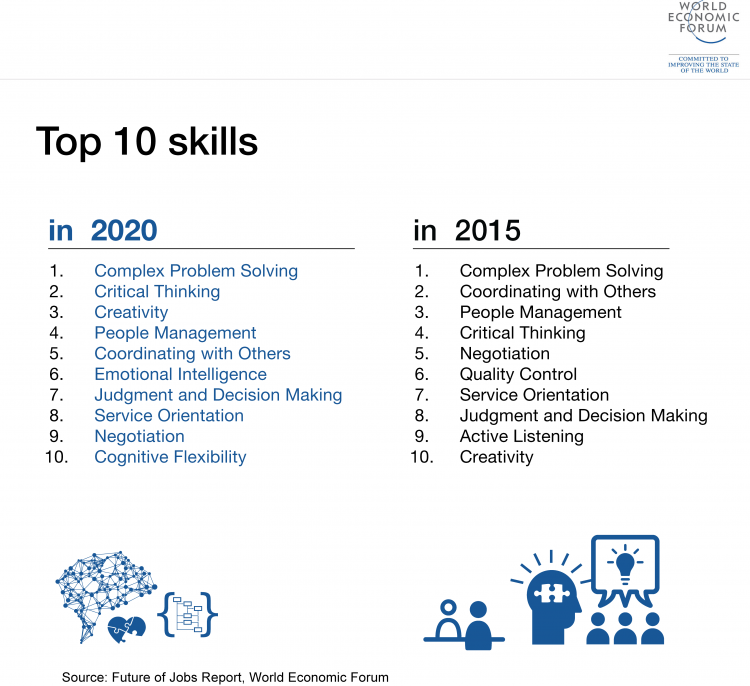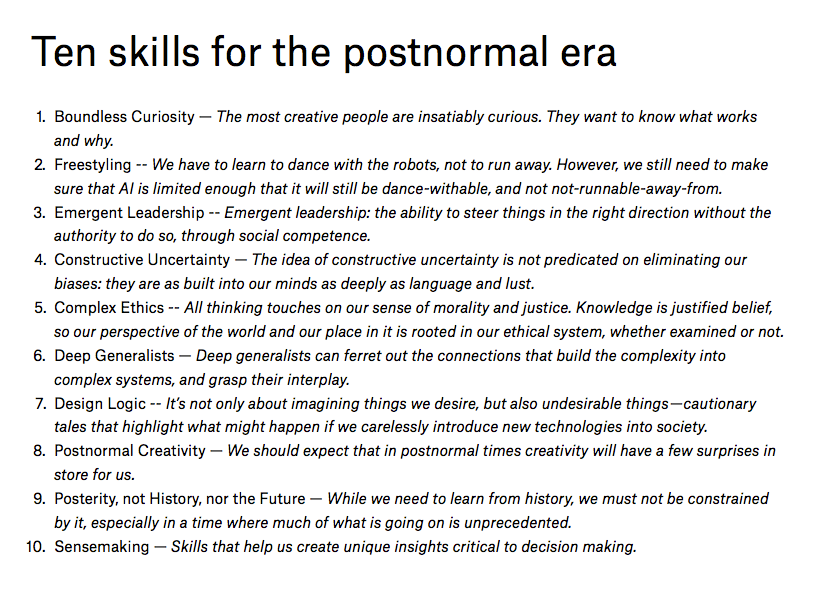More sharing as this get s filed just under "work."
I like this idea of a "postnormal" era.
The list is enough. I am not super inclined to go read the rest by following the lure to the author's personal site, but I might change my mind.
FROM - (goes to MEDIUM article)
https://workfutures.io/10-work-skills-for-the-postnormal-era-2c07a1009a25
Stowe Boyd
10 work skills for the postnormal era
World Economic Forum’s skills list is way out of date
Dion Hinchcliffe tweeted out a graphic (not exactly the one below, but essentially the same) listing skills for 2020 in contrast to 2015 offered up by the World Economic Forum. He got me to thinking.
I think the World Economic Forum (WEF) — or their contributors on the report, Till Alexander Leopold, Vesselina Ratcheva, and Saadia Zahidi — are at least five years out of date. I think the set of skills they list for 2020 are the sort that CEOs and HR staff would have picked for new hires in 2010, or even 2005. I don’t hear the future calling in this list.
Here’s my table of skills, which also serves as a TL;DR if you are in a
hurry:
First of all, let’s state explicitly that we’re talking about skills
that are helpful for operating in the wildly changing world of work, and note
that I make no distinction between the skills needed by management versus
staff. That is an increasingly unhelpful distinction, as the skill set will
make clearer, perhaps.
Here’s some alternatives to those listed by WEF, which we’ll call
postnormal skills. With the exception of Boundless Curiosity, they aren’t ordered by importance, although I bet for
different domains they could be weighted profitably.
Also note that I left out a bunch of skills that are still relevant,
like reading and writing and ‘rithmetic, as did the WEF researchers. But I am
also dropping skills like coordinating with others, emotional intelligence, and complex problem solving. Because d’uh. Also missing are givens like virtual collaboration, new literacy, and participatory engagement. Again, these are today’s skills, since 2005 at least,
or have the uncharming characteristic of being so commonplace that everyone
thinks they know what they mean, even if they don’t. So let’s at least plow
some more fertile fields, shall we?
Here’s my ten pack:
1. Boundless Curiosity
The
most creative people are insatiably curious. They want to know what works
and why.
In a world that is constantly in flux, dominated by a cascade of
technological, sociological, and economic change, the temptation may be to shut
our eyes and close our ears. However, the appropriate response is to remain flexible,
adaptable, and responsive: and the only hope for that is a boundless curiosity.
Our educational system and business culture work hard to ‘suppress our
natural tendency to be curious’, as Jamie Notter said. Messing
around beyond the frontiers of the conventional can lead to dangerous ideas,
which are generally stamped out as quickly as possible.
As I wrote a few years ago,
Curiosity occurs in the absence of extrinsic rewards,
and people vary greatly in their degree of curiosity, or their responses to
events and contexts that spur curiosity. It’s built into our brains, where we
are rewarded for being curious with dopamine, the Kim Kardashian of
neurotransmitters.
I believe that the most creative people are insatiably
curious. They ask endless questions, they experiment and note the results of
their experiments, both subjectively and interpersonally. They keep notes of
ideas, sketches, and quotes. They take pictures of objects that catch their
eye. They correspond with other curious people, and exchange thoughts and
arguments. They want to know what works and why.
Curiosity is in fact the number one thing that Google now searches for
in job candidates, now that they’ve junked the ‘how many ping-pong balls fit in
a school bus’ nonsense. Laszlo Bock, Google’s head of People Operations, was interviewed on
the topic:
For every job, though, the №1 thing we look for is
general cognitive ability, and it’s not I.Q. It’s learning ability. It’s the
ability to process on the fly. It’s the ability to pull together disparate bits
of information. We assess that using structured behavioral interviews that we
validate to make sure they’re predictive.
See longer discussion at Work skills for
the future: Curiosity.
+++++++++++++++++++++++++++++++++++++++++++++++++++++++++++++++++++++++
+++++++++++++++++++++++++++++++++++++++++++++++++++++++++++++++++++++++
+++++++++++++++++++++++++++++++++++++++++++++++++++++++++++++++++++++++
- Bloggery committed by chris tower - 1904.17 - 10:10
- Days ago = 1383 days ago
- New note - On 1807.06, I ceased daily transmission of my Hey Mom feature after three years of daily conversations. I plan to continue Hey Mom posts at least twice per week but will continue to post the days since ("Days Ago") count on my blog each day. The blog entry numbering in the title has changed to reflect total Sense of Doubt posts since I began the blog on 0705.04, which include Hey Mom posts, Daily Bowie posts, and Sense of Doubt posts. Hey Mom posts will still be numbered sequentially. New Hey Mom posts will use the same format as all the other Hey Mom posts; all other posts will feature this format seen here.



No comments:
Post a Comment